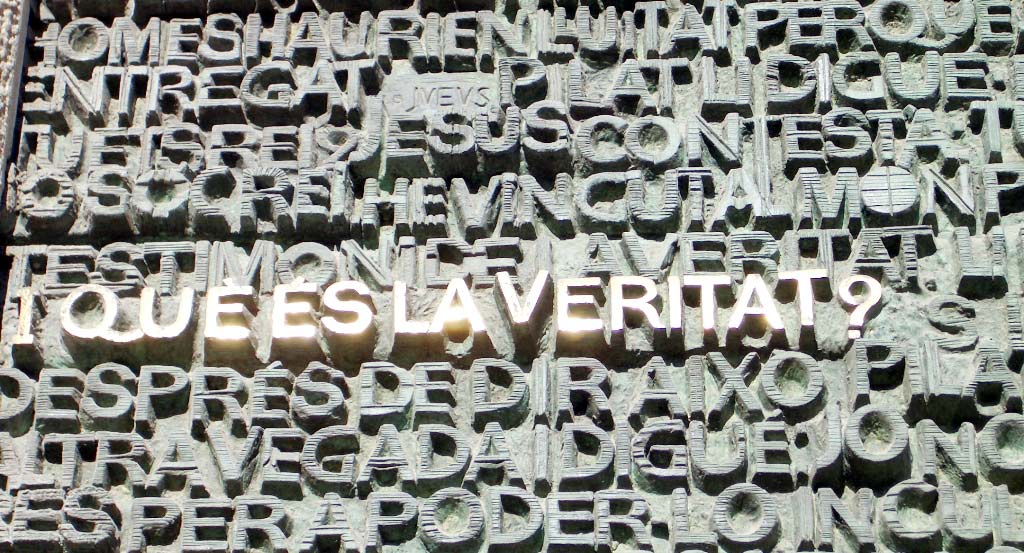[This article is from a talk I gave to members of the Olympic Club on May 26, 2016. I’ve added a few links and shared it here for members of the Olympic Club and the broader public. I’ve turned off comments but feel free to reach me on social media.]
an 8 minute talk and an even quicker read
Good afternoon gentlemen. Today I’m going to talk about the Truth.
3 noteworthy things happened this week.
- First, a new book came out Bravehearts: Whistleblowing in the Age of Snowden. In the book, the senior DOD official in charge of the federal whistleblower program goes public with accusations that key officials retaliated against whistleblowers, destroyed permanent records and altered audits of multibillion dollar programs. They did this under political pressure. This senior official calls into question the very program that is supposed to protect whistleblowers when they report fraud, abuse, and waste.
- Another noteworthy thing that happened was the acquittal of Edward Nero, one of the Baltimore police officers involved in Freddy Gray’s arrest and subsequent death. If you recall, the original incident is what sparked the Black Lives Matter movement.
- And the 3rd thing that happened this week is that snopes.com, debunked stories that reported violence and specifically chairs being thrown at the democratic convention in NV. Numerous media outlets regurgitated the original tale that was casually fabricated in a 140 character tweet. Media outlets on the bandwagon included: The New York Times, CNN, MSNBC, the Associated Press, CBS, and NPR.
It has been a really busy week for the TRUTH.
Now, no matter what we believe or how we react to these developments, there is a TRUTH that supersedes our opinions and reactions. I view truth much like I do gravity. You can choose not to believe but that doesn’t make it go away.
What is Truth?
I want to be crystal clear on what I mean when I say Truth. I’m talking about conformity to facts; accuracy. Certainties. The truth I’m talking about isn’t squishy. A moral relativist would have you believe that truth is relative to the circumstances. I’m not talking about a malleable truth or aberration of fact. I’m taking about that which is incontrovertible. Like Newton’s law of universal gravitation. It applies to everybody whether they choose to believe it or not.
Human Responses to The Truth
When we are exposed to a new truth, our reactions fall into a predictable range of human responses:
- We can be apathetic. Maybe what we are hearing is simply noise to us. We really can’t be bothered with it.
- Another response is we may simply adopt the truth immediately and adapt our own views.
- We may also seek clarity. A person can react by seeking new information and knowledge – “Help me to see what you see, Mr. Severs.“
But sometimes the facts don’t fit our current views at all – that internal narrative we play in our head. When our views are challenged with a new truth we have a few OTHER options to choose from.
- We can object outright: “That’s not true.” We can do this loudly and aggressively or we can do this quietly, slipping out of the conversation or even the room.
- We can also redirect attention: This is the magician’s trick – misdirection. Here, we shift the attention to something else more fitting of our own views.
- Another predictable reaction is we resort to any one of several logical fallacies. There are plenty of these to draw from. Most people are unaware of these fallacies even as they commit them.
The original logical fallacies were documented more than 2400 years ago by Plato and his thinking colleagues. You’d think we’d have learned by now.
Here are a few of my favorite logical fallacies.
The Ad Hominem Argument: This is where you attack your opponent’s character or personal traits in an attempt to undermine their argument.
Example: It is conceivable that any one of the presidential candidates could say something truthful. It could happen! But, reactions to their statements could easily be, “Well, he’s a communist.” “She’s a pant suits Nixon.” “He’s a xenophobe” So, we can’t trust them.
Another common logical fallacy is the The Appeal to Tradition: This is the fallacy that a standpoint, action or situation is right, proper and correct simply because it has “always” been that way. Imagine not being able to advance human progress in the name of tradition. You’d still be cooking over fire, hunting and gathering your own food, and you certainly would not be able to read this passage, and least of all on a computer or smartphone.
The opposite of this is The Appeal to Novelty or Innovation. This is the notion that this is NEW, and [therefore it must be] better!”
Then there is the The Big Lie Technique. This is the contemporary fallacy of repeating a lie, slogan, or talking-point until it becomes part of daily discourse and is no longer questioned. An example is the non-existent “Weapons of Mass Destruction” “WMD’s” in Iraq, used in 2003 as a false justification for invading that country. [See also Mind Hijacked: A History Lesson in Propaganda.]
There are a host of other logical fallacies. [University of Texas at El Paso has compiled a living document of logical fallacies. A nicely designed poster of commonly used logical fallacies has been created by Your Logical Fallacy Is.]
What About Reaction to Lies?
Up to now I’ve been talking about our range of reactions when we are exposed to the TRUTH. But, what if we are exposed to a lie? Sadly, it doesn’t really much matter.
Whether it is fact or fiction if it reinforces our beliefs then we strengthen our views, digging our heels in further. And, if it doesn’t strengthen our views then we dismiss it. Researchers refer to this phenomena as the “backfire effect.” It is even more pronounced when the new information challenges an especially emotional or long held belief. For a depth reading with examples on WMDs, Stem Cell Research, and Climate Change see this document.
The takeaway from this is: it’s really hard to change people’s minds. Some people will want to build a wall, no matter the facts presented to them.
Friedrich Nietzsche said it well, “Sometimes people don’t want to hear the truth because they don’t want their illusions destroyed.” I want to put this another way, “We only see the truth we are looking for.”
Conclusion
I opened this talk with stories about Freddie Grey, the new book BraveHearts, and debunked reports of chairs being thrown at the democratic convention. I used these 3 examples because:
- Protecting Truthtellers is important in a free and democratic society. Truthtellers can prevent and end wars and get dangerous products removed from the market. [See also: Preventing the Next Scandal]
- Police brutality is inexcusable, period. Lucky for you it wasn’t your family member. But Freddie Gray was someone’s son & brother.
- Communication of all forms has become faster AND sloppier. When experienced reporters and media outlets are quick to judge and almost as quick to report, the Truth can Suffer.
TRUTH SHOULD MATTER.
Our republic in caught in the grips of a protracted presidential election. As a nation, we face important issues. It is hard to solve problems when you don’t even agree on the truth.
Ann Richards the former democratic governor of Texas once said, “We’re not going to have the America that we want until we elect leaders who are going to tell the truth not most days, but every day.”
But, the Truth is too important to leave to politicians, alone.
So, What Can WE Do?
In a civilized society each of us has a duty to respect and uphold the truth. We also have a duty to hold others accountable to do the same. Imagine the possibilities if we made the truth matter. In this election year, the Republican and Democratic parties are splintered. They are worried about healing and uniting their respective parties.
Their focus however, Ought To Be on healing a nation, not a political party. And, that gentlemen is the Truth. Now, I’m counting on You to uphold it.
about the author

Gregory Olson’s latest book is L’ impossi preneurs: A Hopeful Journey Through Tomorrow, a light-hearted and deadly serious book about a brighter future where we live more meaningful lives, governments invest in people and sustainable progress, and technology serves humans. Greg also authored The Experience Design Blueprint, a book about designing better experiences and then making them come true.
Gregory Olson founded strategy and design firm Delightability, LLC. with the belief that if you delight customers then success will follow. He believes that we all have the potential to do better, as individuals, organizations, and communities, but sometimes we need a little help.




 Gregory Olson founded strategy and design firm Delightability, LLC. with the belief that if you delight customers then success will follow. He believes that we all have the potential to do better, as individuals, organizations, and communities, but sometimes we need a little help. Gregory also serves as a volunteer board member for
Gregory Olson founded strategy and design firm Delightability, LLC. with the belief that if you delight customers then success will follow. He believes that we all have the potential to do better, as individuals, organizations, and communities, but sometimes we need a little help. Gregory also serves as a volunteer board member for